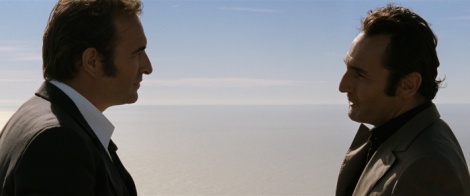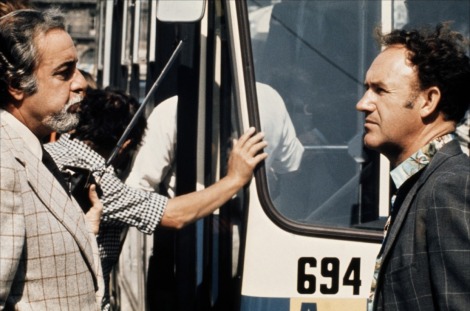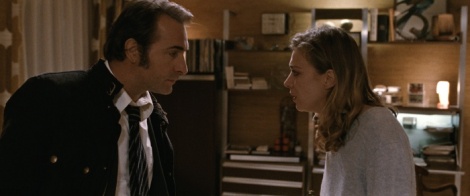
What: Film Review
Directed by: Cédric Jimenez
Written by: Cédric Jimenez, Audrey Diwan
Starring: Jean Dujardin, Gilles Lellouche, Céline Sallette, Mélanie Doutey, Benoît Magimel, Féodor Atkine
Produced by: Ilan Goldman
Languages: French w/ English subtitles, English
Running Time (in min.): 135 minutes
Rating: R
Official Selection of the 2014 Toronto International Film Festival
*****
Editor’s Note: The Connection continues to screen in theaters around the U.S. It is available through Drafthouse Films on Blu-Ray and DVD as of Sept. 29, 2015.
*****
It would be naïve to ask why filmmakers are so willing and ready to soil the legacies of their colleagues. Answers come quickly to those asking – why? Because money, artistic confidence, and the illusion of having the final word on any subject have equal worth for many – but still, when I see a film like The Connection, I wonder. For the European mini-major Gaumont, which produced the film, and for its co-writer/director, Cédric Jimenez, the opportunity to tackle the crime syndicate known as “la French” from a domestic point-of-view must have been impossible to pass up. But rather than add new dimensions to the tales already told in William Friedkin’s legendary The French Connection and its John Frankenheimer-directed sequel, The Connection obliterates the novelty and bracing tension that characterized those films at the height of their fame. Under Jimenez, the 2014 film is to the legacy of the 1970s classics what Episodes I, II, and III have been for the original Star Wars trilogy.
What’s happening at the story level is entertaining enough while you’re caught up in it. Jean Dujardin, the Academy Award-winning star of Academy Award-winner for Best Picture of the Year, 2011’s The Artist (if you can remember that far back), is Pierre Michel, a zealous, smirking magistrate in 1970s Marseille. Rife with drug dealing, extortion, corruption and murder, the city is being slyly controlled by the nefarious The French. Michel, recently transferred from the more forgiving Juvenile Court – where he really felt like he was making a difference! – to Organized Crime determines to clamp down on high-level thuggery, even if it means infuriating the local godfather, Tany Zampa (France’s darling, Gilles Lellouche). And so it does, putting Michel’s whole squad (many of their ranks already infiltrated and corrupted) in the line of fire while Zampa spreads his greasy tentacles into Paris, Turkey, and New York. Smooth move, exlax.

So begins a war between police and criminals the likes of which we’ve never seen…or rather, pardon me, that we’ve never not seen in a crime film since the 1940s. Zampa is equal parts pathological narcissism, calm intimidation, and furious paranoia; Michel is a family-ignoring, thrill-addicted do-gooder; and together, Dujardin and Lellouche make for great mirrors, their black hair slicked back with identical amounts of Pomade. Their somewhat homosocial rivalry is the film’s strongest quality, a noir throwback that calls to mind the macho-antagonisms Cornel Wilde and Richard Conte brought to The Big Combo, or more recently, Fernando Rey and Gene Hackman to French Connection. But these action-loving predecessors loom large compared to the duller, less realized figures in the new flick.


Lellouche is the richest and most dominating of the characters, brutish but surprisingly nimble, his Zampa a typical combination of “family man” and “ruthless killer.” Likewise, as Pierre Michel, a rapscallion of a judge whose hatred for avarice leads him to challenge his superiors, Dujardin follows dramatic protocol here: rather than giving in to his more typical impish tactics in recent Hollywood flicks like The Monuments Men [2013, dir. Clooney] and The Wolf of Wall Street [’13, dir. Scorsese], he moves with precision and aggression, creating a reasonable case for consideration in “darker” roles.
But the supporting cast hardly makes out as well, coming together mostly for exposition. Céline Sallette and Mélanie Doutey, for example, give all they’ve got as the respective partners of Michel and Zampa, but neither makes any sort of dent in the plot save for the inevitable scene in which one partner threatens to take the kids and leave (guess who’s?) Sallette and Doutey are not to blame – the former is actually quite convincing as the true-but-tried spouse – for being lamed by the narrative needs of a male-dominated criminal/justice system conflict. As a local politician in Zampa’s hand, Féodor Atkine is paradigmatically, laughably sour, as are the many men telling Michel he’s “gone too far this time,” etc.

For the film’s general redundancies, I hesitate to accuse the actors, or the technicians, who also come out fine. Energetically shot by Laurent Tangy (whose work in Melanie Laurent’s The Day I Saw Your Heart truly moved me) and tautly edited by Sophie Reine, The Connection proceeds with such efficiency that even its extreme derivativeness can’t shut off the entertainment. Guillaume Roussel’s original score falls into the pulse-pounding category, but it’s mercifully utilized over the film’s two-plus-hour stretch. This is fine craftsmanship, assured and pleasing to the eye. Still, the onus for its dramatic lack of drama has to fall somewhere – and I place it, with no personal scorn, on the script by Jimenez and Audrey Diwan.
Jimenez and Diwan put too many inexcusable clichés in the mouths of the forsaken cops, not just Pierre Michel – given to telling stories about a “friend” of his with a gambling problem (hint: he’s an Organized Crime magistrate) – but also the many shit-talking gangsters under Zampa. In the world of The Connection, every Marseille tough wears a leather jacket, hates “the pigs,” and loves cocaine; these traits are so unanimous that I was reminded of Scott Cooper’s Black Mass, the Whitey Bulger biopic now in theaters. That film has been criticized for its overuse of South Bostonisms, with Whitey and his cohort challenging each others’ masculinity, hating pigs, wearing leather jackets, and taking drugs. These ersatz worlds are too similar for my comfort, especially since they should logically be so distinct from one another.
